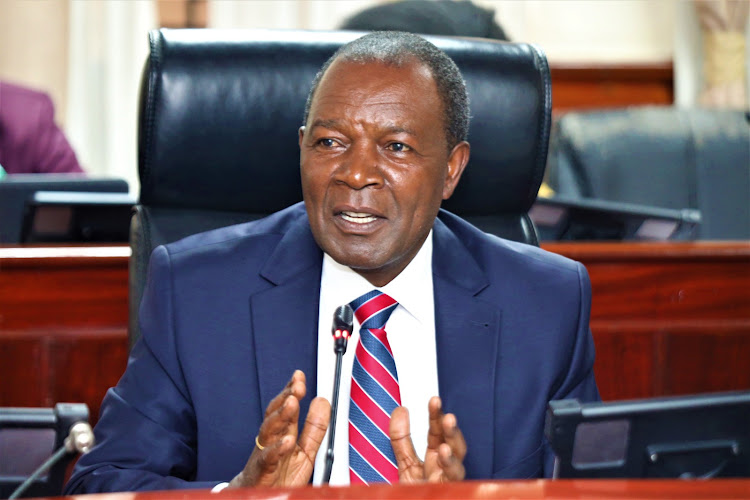
How cartels are making a kill from pending bills
Details have emerged of how cartels working in cahoots with dishonest state officers are raking in millions from pending bills accrued by the national and county governments.
The Star has established that the groups are targeting desperate contractors and suppliers that have pursued payments for years without success.
In a brazen move, the cartels insist on signing fake legal contracts with suppliers which they use to demand kickbacks once the payments are made by governments.
The vice is said to be so entrenched in ministries and state corporations that have for years failed to clear their bills despite presidential directives.
“Pending bills have now become the soft spot and the easy target for collusion and theft of public resources,” Senate County Public Accounts Committee chairman Moses Kajwang told the Star.
Kajwang’s committee scrutinises audit reports for county governments that reveal billions accumulated by the devolved units in pending bills.
To show their connections, contractors who spurn the cartels will not have their bills paid despite being cleared.
Sources told the Star that the said cartels are now approaching even international organisations for kickbacks, giving Kenya an unfavourable image in the international community.
There are also reports of diplomatic tensions where Kenya has reportedly been reluctant to pay its pending bills.
“These people work at the behest of government officials. It’s difficult to doubt them because they hang around key people,” sources said.
Ethics and Anti-Corruption Commission CEO Twalib Mbarak and Treasury PS Chris Kiptoo did not respond to our inquiry.
However, Controller of Budget Margret Nyakang’o in an interview with the Star, raised concerns about the never-ending pending bills that are taking a toll on contractors.
“It’s a serious concern to me and my office because we have always asked the MDAs and counties to consider payment of pending bills as a first charge,” she said.
Thousands of government contractors and suppliers are undergoing untold pain and suffering with some falling into depression.
Some have had their property auctioned by banks for failing to settle loans they secured to supply county and national government agencies.
The latest report by the controller of budget reveals that the national and county governments owed their contractors a total of Sh727.74 billion.
This compared to Sh685.62 billion –an increase of Sh42.12 billion from June 30, 2022.
This comprises Sh123.91 billion (17 per cent), Sh443.60 billion (61 per cent) and Sh16 billion (22 per cent) for MDA’s, State Corporations and County governments respectively.
This was as of June 30, 2023, implying that the bills could be hitting the Sh1 trillion mark now.
In revelations that corroborate massive collusion going the counties and state agencies, Nyakango exposed how some legal firms approached her to push for their payments.
“These lawyers, who worked for Nairobi county, came to me and told me that their law firms had been removed from the list of firms that were supposed to be paid,” she said.
“But then I asked them, how did your firms get on the list yet their debts are not the oldest? Because we have a policy that old debts are cleared first.
“That means they found themselves on the list through some dubious and illegal means. I sent them away.”
Nairobi has in excess of Sh100 billion worth of pending bills, with about Sh20 billion of the amount owed to external law firms alone.
Kajwang revealed that besides payment, the collusion has also taken the form of inflation of bills, manipulation of papers and weak or total legal representation in court for counties and national governments
“This is the area where we want EACC to come up because there are huge amounts of money that people are making just by shuffling papers and creating records,’ the senator said.
“Finally, if we look at the 47 reports of assumption office of governor’s committees, across the country, I’m yet to find a governor who tells me that what was handed over to them was correct.
“All of them are saying that what was handed over to them was exaggerated. How does it get exaggerated in a committee that has the auditor general, controller of budget and county commissioner? There is something very wrong.”
On June 27, 2023, the Cabinet approved the formation of a special committee verification of pending bills.
The Committee was tasked with auditing liabilities for the period between 2005 and 2022.
It consists of members from the Attorney General’s Office, the State Department of Roads, the State Department of Public Works, the State Department of Housing and Urban Development and the Public Procurement Regulatory Authority.
However, Nyakangó lamented that the committee does not include critical institutions in public finance management such as the Controller of Budget, Office of the Auditor General, the National Treasury and County Treasuries.
The formation of the committee came days after the World Bank – one of Kenya’s biggest lenders –warned the huge pending bills were driving businesses into defaults and curtailing cash flows to the private sector.
“Pending bills in Kenya and non-performing loans have been trending in the same direction for the last two years,” the World Bank said in its Kenya Economic Update report in June.
Soon after the swearing-in of current governors last year, the Ethics and Anti-Corruption Commission cautioned them against paying unverified pending bills.
In a circular issued to all County Governments on Saturday, EACC boss Twalib Mbarak pointed out that the commission had observed a trend where governors handled pending bills in disregard of the applicable laws.
“The commission notes that some incoming Governors and their administrations are handling existing staff, new recruitments, and pending bills in disregard of the applicable laws, policies, and procedures,” the circular reads in part.
The last member, the lender stated that the quality of Kenya’s budget implementation had declined due to corruption and huge pending bills.
In 2019, former President Uhuru Kenyatta directed all national and county government agencies to clear their pending bills that did not have audit queries within a month.
During the unveiling of the 2021-22 budget in Parliament on June 10, 2021, the then Treasury CS Yatani gave the agencies up to the end of the month to settle the bills.
The CS threatened to withhold funds to agencies and county governments that defy the directive.
“I direct government ministries, departments and agencies and the county governments to clear all their pending bills by June 30, 2021,” Yatani had said.
